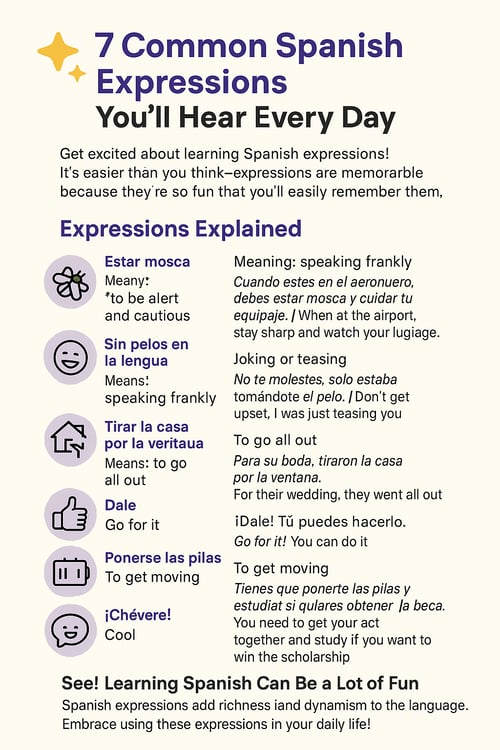7 Common Spanish Expressions you’ll hear everyday

We'll tell you straight up, without beating around the bush: sometimes words aren’t enough to express what we think and feel. Spanish is certainly a rich language in terms of vocabulary, but in this article, you’ll see how rich it is in expressions. Keep reading and learn Spanish with us.
So let’s start by taking the first step in our exploration of common Spanish expressions. Let’s discover where they come from.
Spanish expressions emerged from the need to communicate daily life aspects precisely and vividly, in ways that common words couldn’t fully capture. They are rooted in everyday experiences, influenced by social and regional context, cultural and historical factors, a good deal of linguistic creativity, and sometimes from borrowing words from other languages.
Get excited about learning Spanish expressions!
It’s easier than you think—expressions are memorable because they’re so fun that you’ll easily remember them.
Expressions Explained
Estar Mosca
- Meaning: Literally "to be fly" (the insect), "estar mosca" means to be alert and cautious. It’s especially used when someone might be at risk or in an unfamiliar place where they could be deceived.
Example: Cuando estés en el aeropuerto, debes estar mosca y cuidar tu equipaje. / When at the airport, stay sharp and watch your luggage.
Sin pelos en la lengua
- Meaning: Literally "without hair on your tongue," this suggests that if someone had hair on their tongue, they wouldn’t be able to speak. This expression means speaking frankly, without holding back.
Example: En la reunión lo dije todo, sin pelos en la lengua. / At the meeting, I said everything without holding back.
Tomar el pelo
- Meaning: "Take the hair" doesn’t make sense in English, but in Spanish, it’s used to say that someone is joking or teasing another person.
Example: No te molestes, solo estaba tomándote el pelo. / Don’t get upset, I was just teasing you.
Tirar la casa por la ventana
- Meaning: Although literally "throw your house out of the window," this Spanish expression means that someone has thrown a big party or spent a lot on an event.
Example: Para su boda, tiraron la casa por la ventana. / For their wedding, they went all out.
Dale
- Meaning: Very common in reggaeton, "dale" can be translated as "go ahead" or "go for it."
Example: ¡Dale! Tú puedes hacerlo. / Go for it! You can do it.
Ponerse las pilas
- Meaning: Although we’re not robots that need "to put batteries in," this Spanish expression suggests that someone should "wake up" or "get moving."
Example: Tienes que ponerte las pilas y estudiar si quieres obtener la beca. / You need to get your act together and study if you want to win the scholarship.
¡Chévere!
- Meaning: Common in many parts of Latin America, especially in the Caribbean, it means "cool" or "very good."
Example: ¿Cómo estás? – Chévere. / How are you? – Very nice.

See! Learning Spanish Can Be a Lot of Fun
Spanish expressions add richness and dynamism to the language. Learning these common Spanish expressions will not only improve your understanding of the language but also allow you to communicate more authentically and closely with native speakers. Embrace using these expressions in your daily life! And remember, at WorldsAcross, we’re here to help you learn Spanish, providing support and confidence every step of the way. So let’s get to work—your adventure in the world of Spanish is just beginning!





